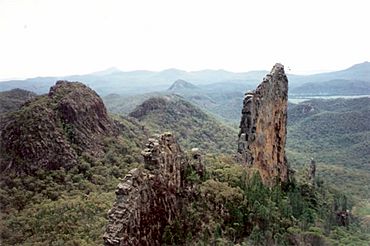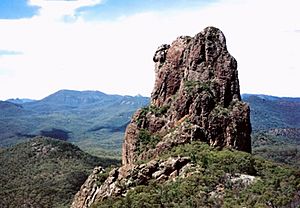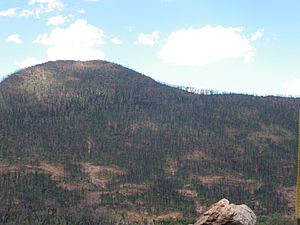Warrumbungle National Park facts for kids
Quick facts for kids Warrumbungle National ParkNew South Wales |
|
|---|---|
|
IUCN Category II (National Park)
|
|

The Breadknife
|
|
| Nearest town or city | Coonabarabran |
| Area | 233.11 km2 (90.0 sq mi) |
| Visitation | 35,000 (in 2011) |
| Managing authorities | National Parks and Wildlife Service (New South Wales) |
| Website | Warrumbungle National Park |
| See also | Protected areas of New South Wales |
Warrumbungle National Park is a special national park in New South Wales, Australia. It's about 550 kilometers (340 miles) northwest of Sydney. This park is famous for its amazing mountains, which are actually the remains of an ancient volcano!
The park is part of the Warrumbungle Mountain Range. People often just call the park "the Warrumbungles." It's also a very important place for birds, especially woodland birds, and some of them are quite rare.
In 2006, Warrumbungle National Park was added to the Australian National Heritage List. This means it's a really important place for Australia's history and nature. In 2016, it became the first park in Australia to be named a Dark Sky Park. This means it's one of the best places in the world to see the stars at night because there's very little light pollution.
Contents
Getting to the Park
The closest towns to Warrumbungle National Park are Coonabarabran to the east and Coonamble to the west. If you're coming from Coonabarabran, it's an easy 27-kilometer (17-mile) drive on a sealed road. From Coonamble, it's a bit further, about 57 kilometers (35 miles), and some parts of that road are gravel.
Amazing Mountains and Wildlife
Warrumbungle National Park is known for its incredible mountains and rock formations. These were formed by a huge volcano many millions of years ago! Some of the most famous rock shapes you can see include Bluff Mountain, Mount Exmouth (which is the tallest mountain in the park), The Breadknife, Split Rock, and Crater Bluff.
The park is a great place for outdoor adventures. You can go on many scenic bushwalks, and if you're into it, rock climbing and abseiling are popular activities here.
Sadly, a big bushfire in 2013 badly affected the park. Before the fire, the park was a home for koalas. After the fire, it was thought that no koalas survived in the park.
Right next to the national park is the Siding Spring Observatory. This is a very important place for scientists who study space. It was built here because the national park helps keep the area dark at night, which is perfect for looking at stars and planets!
Park Facilities
If you want to stay overnight, there are four main campsites in the park. You need to get a permit to camp. There's also a visitors center where you can book your spot and get keys for some huts. The park can even host large school groups.
You'll find free electric barbecues available for cooking. However, you can't collect firewood inside the park, so make sure to bring your own if you need it for other purposes.
Park History
People started wanting to protect the beautiful Warrumbungle Range way back in 1936. The area officially became a reserve in 1953. In 1967, the National Parks and Wildlife Service took over managing the park.
The park was added to the National Heritage List in 2006. This was because of its amazing volcanic landforms, which are unique in Australia. It's also important because it's a special place where dry western areas meet wetter coastal areas, creating a unique habitat for plants and animals.
The 2013 Bushfire
In January 2013, a huge bushfire swept through the area. About 80% of Warrumbungle National Park was burned. The fire also destroyed many homes nearby. The park's visitor center and museum were lost, along with many railings and viewing platforms.
The park was closed after the fire, but it has since reopened. Some parts might still be closed as the park continues to recover.
See also
 In Spanish: Parque nacional Warrumbungle para niños
In Spanish: Parque nacional Warrumbungle para niños
 | Frances Mary Albrier |
 | Whitney Young |
 | Muhammad Ali |



